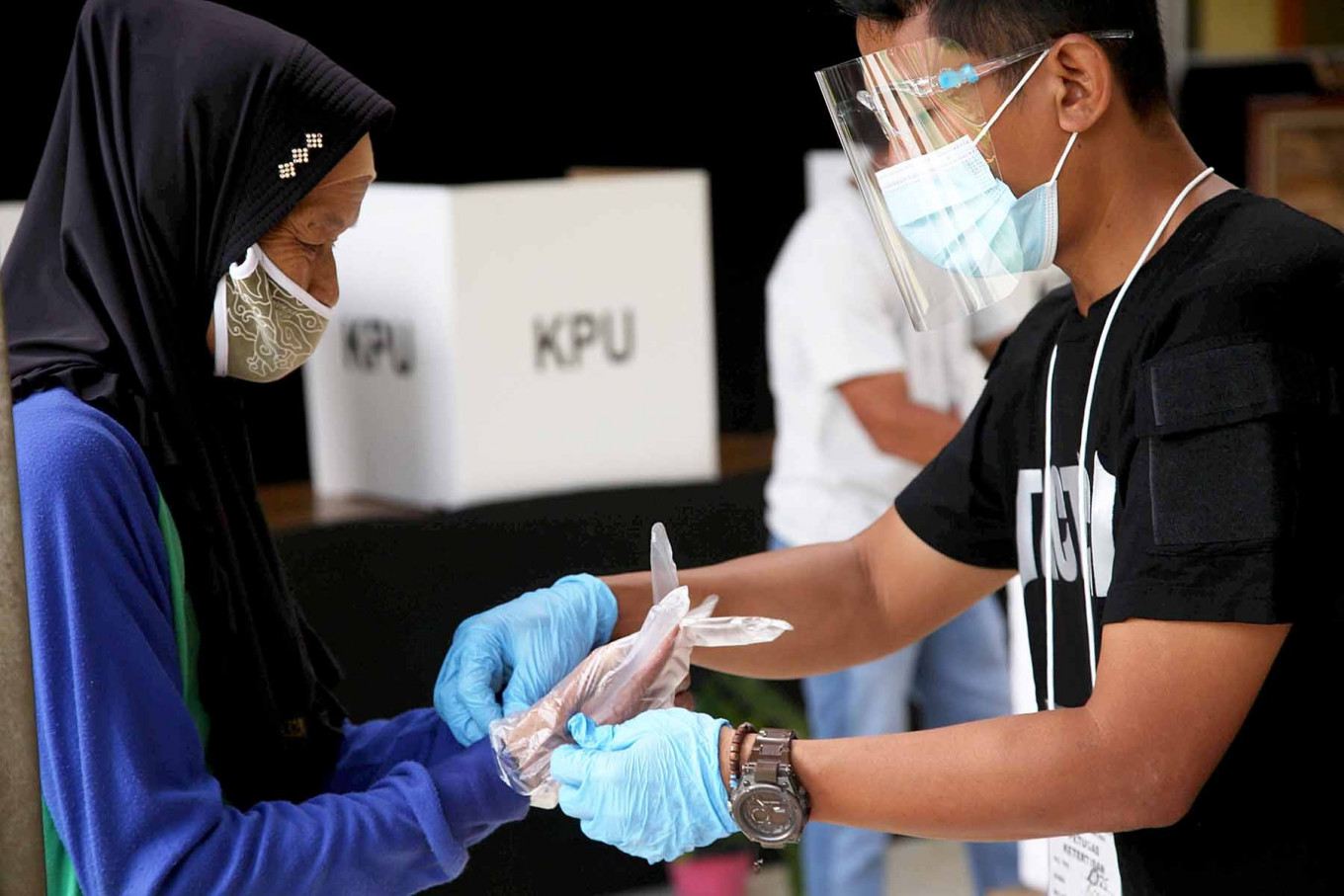Popular Reads
Top Results
Can't find what you're looking for?
View all search resultsPopular Reads
Top Results
Can't find what you're looking for?
View all search resultsBetrayal to the people
The government’s choice of active police and military officers for some of the interim regional head posts implies its penchant for a security approach, which also typified the New Order under Soeharto.
Change text size
Gift Premium Articles
to Anyone
 A poll worker (right) helps a woman put on a plastic glove before she casts her ballot at a polling station in Tapos, Depok, West Java, on Dec. 9, 2019. Poll workers enforced strict health protocols on voting day for the Depok mayoral election, requiring voters to wear gloves and face masks, among other precautions. JP/P.J. Leo (JP/P.J. Leo)
A poll worker (right) helps a woman put on a plastic glove before she casts her ballot at a polling station in Tapos, Depok, West Java, on Dec. 9, 2019. Poll workers enforced strict health protocols on voting day for the Depok mayoral election, requiring voters to wear gloves and face masks, among other precautions. JP/P.J. Leo (JP/P.J. Leo)
T
he government is dousing the flame of reform by insisting on the appointment of active military and police officers as acting regional heads, who will assume the jobs until after the simultaneous regional elections in November 2024.
Home Minister Tito Karnavian said the government had the right to recruit active military and police officers for the jobs and exercised it with the appointment of State Intelligence Agency’s (BIN) Central Sulawesi bureau head Brig. Gen. Andi Chandra As'aduddin as the acting regent of West Seram in Maluku. Following Andi’s inauguration on May 24, more military and police officers will likely join the list.
Tito, known as one of Indonesia’s most intelligent police generals, should know very well the government’s move is not only a blatant violation of the law, but it also betrays the sweeping reforms of 1998 that restored civilian supremacy after three decades of military-backed dictatorship.
Tito himself had set a good example by retiring from the police force, although he still had three more years left before his career ended, when President Joko “Jokowi” Widodo appointed him the home minister in October 2019.
The government ignored the Constitutional Court’s judicial opinion asking for “measurable and clear mechanisms” to select acting regional heads to make sure it did not violate democratic principles. For that purpose, the court asked the government to issue a regulation to implement the 2016 Regional Election Law, which bans active military and police personnel from running for regional heads.
The 2016 law says nothing as to whether or not officers can be appointed as interim heads, but the 2004 Indonesian Military Law and the 2002 Indonesian Police Law prohibit them from holding civilian posts and require them to retire to do so – as Tito did.
The government’s choice of active police and military officers for some of the interim regional head posts implies its penchant for a security approach, which also typified the New Order under Soeharto. During that era, the military held as many civilian jobs, including regional head posts, as Soeharto wished. The military and police served as Soeharto’s effective tools to silence critics and cling on to power.
The reform movement, however, forced Soeharto to step down and brought democracy back to life. The sweeping reforms also led to the separation of the police from the military, with the former focusing on domestic security and public order and the latter in charge of protecting the nation from external threats.
Now, after more than two decades, the temptation to revive the New Order tactics is difficult for the power-hungry political elite to resist. This year and next year open up opportunities for those who want to rob the people’s right to choose their leaders.
This year seven provinces, 18 cities and 76 regencies will be led by acting officials who are loyal to the central government. Next year 17 provinces, 115 regencies and 39 cities will lose their elected leaders. Despite their interim status, the acting officials in practice hold similar powers to the elected ones.
The 2016 law mandates the government to pick acting regional heads from civilian top-echelon officials, otherwise it will violate the spirit of democracy and people will never forget, let alone forgive, this act of betrayal.









